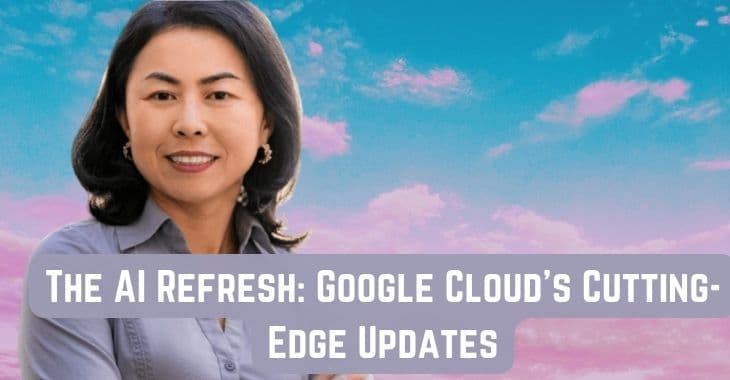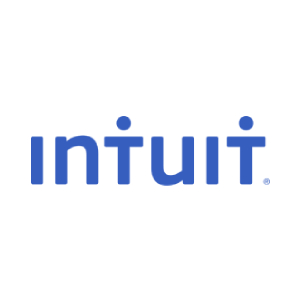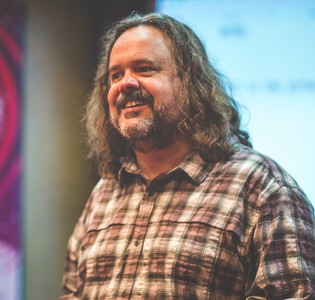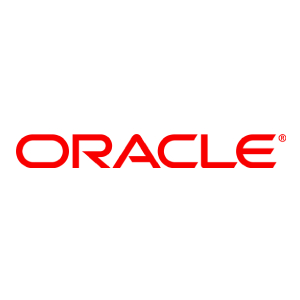The AI Refresh: Google Cloud's Cutting-Edge Updates

Generative AI has been making waves in the tech industry, and Google Cloud is at the forefront of this revolution. At the recent Google Cloud Next 2023, June Yang, Vice President of Cloud AI and Industry Solutions at Google Cloud, unveiled the latest advancements in generative AI.
Here's a deep dive into the key takeaways.
1. The Rise of Foundation Models
“AI is undergoing a major shift with the rise of foundation models. Now you can leverage these foundation models for a variety of use cases without ML expertise with little to no training data, “says June Yang, Vice President of Cloud AI and Industry Solutions at Google Cloud.
This is a significant leap, as it accelerates the adoption of AI by enterprises, making it more accessible and efficient.
Foundation models have emerged as a transformative force in the AI domain. These models are characterized by their ability to be trained on vast datasets, often through self-supervised or semi-supervised learning. The versatility of foundation models, such as GPT-3, BERT, and DALL-E 2, allows them to be adapted to a multitude of downstream tasks without the need for extensive retraining. This adaptability is what sets them apart. Microsoft's research blog emphasizes the rapid innovation in foundation models, with the release of OpenAI's GPT-4 being a notable milestone. The shift towards foundation models signifies a move from domain-specific AI models to more generalized ones, capable of working across various domains and problems. The potential of these models has expanded the horizons of what's achievable in AI, emphasizing their scale and scope.
2. Enterprise-Ready Generative AI
"Our goal is to bring the power of Enterprise ready generative AI to help organizations innovate faster. Google is the only company that offers the full technology stack from the high-performance AI infrastructure to Foundation models."
Google Cloud is not just about providing generative AI tools but ensuring they are primed for enterprise use. With the introduction of Vertex AI, businesses can seamlessly interact with, customize, and embed foundation models into their applications, eliminating the need for deep ML expertise. The recent announcements at Vertex AI Next 2023 highlighted the expansion of enterprise-ready generative AI development, introducing new models and tooling. Google Cloud has made significant strides with the general availability of enterprise-ready generative AI models in Vertex AI, reinforcing its commitment to providing an enterprise-ready platform for AI innovations.
3. Tremendous Growth and Adoption
"Since April of this year, the number of customers engaging with Google Cloud on generative AI has grown by 15x."
Generative AI's rise has been meteoric, and Google Cloud has been instrumental in this growth trajectory. Google Cloud CEO Thomas Kurian described the ascent of generative AI as one of the most "profound technology shifts in history." Further emphasizing this growth, a Forbes report from Alphabet's Q2 2023 earnings call spotlighted that over 70% of generative AI startups are leveraging Google Cloud's AI capabilities. This adoption isn't limited to startups; established companies like Bose, Gitlab, and World Bank are also harnessing these advanced AI tools for diverse applications. Google Cloud's dedicated Generative AI page offers insights into how businesses can integrate generative AI into their operations, emphasizing its transformative potential.
4. Democratizing AI
"With the rise of generative AI, we can democratize AI far beyond the data scientist, enabling a much larger range of users like developers and business users to take advantage of AI."
Google Cloud's commitment to democratizing AI is evident in its continuous efforts to make AI technologies accessible to a wider audience. As highlighted in a Google Cloud Blog post, the democratization of machine learning and artificial intelligence is pivotal in generating insights in today's data-driven world. This is further emphasized in their 2023 Gartner® Magic Quadrant report, showcasing Google Cloud's dedication to helping organizations build and deploy AI-powered applications. By integrating generative AI capabilities into applications like Contact Center AI and Document AI, Google Cloud is enabling not just data scientists but also business users and developers to harness AI's transformative power for various tasks, from summarization to bot building.
5. Foundation Models – The Core
"A foundation model is a large model that's trained on a vast corpus of data. It recognizes, predicts, generates words, images, text, videos, and more."
Foundation models have emerged as a cornerstone in the AI realm, and Google Cloud is leading the charge in their development and deployment. These models span a wide range of applications, from text-to-image and text-to-code to speech-to-text. A prime example is the Imagen Model Family, which is dedicated to unlocking visual creativity. These models are built upon the advances in large Transformer language models and diffusion models, offering unparalleled capabilities in image generation and editing. Another noteworthy model is Codey, which accelerates software development with real-time code completion and generation, customizable to a user's specific codebase. The recent expansion of the text and chat model, Palm2, further showcases Google's commitment to enhancing foundation models, ensuring they cater to diverse modalities and use cases.
6. Industry-Specific Models
"In addition to the base Foundation models, we're also providing Foundation models for industry-specific use cases like SEC Palm for cybersecurity domain and medpong for medical domain,"
Google Cloud is not just about generic AI; they're tailoring their offerings to cater to specific industries, ensuring that businesses get the most out of their AI investments. Umesh Vemuri, VP of Global Strategic Customers and Industries at Google Cloud, emphasizes the company's unique position to assist enterprises with solutions rooted in a profound understanding of customer needs. This is further substantiated by the Model Garden on Google Cloud, which provides a curated collection of over 100 models. This includes enterprise-ready foundation model APIs, open-source models, and task-specific models from both Google and third parties. Another initiative, the Industry Value Networks (IVN), brings Google Cloud's products, services, and technologies closer together with partners, emphasizing industry domain expertise and offerings. Examples of such industry-specific models mentioned in the article include SEC Palm for cybersecurity and MedPong for the medical sector.
7. Collaboration with GitLab
"Today we're leveraging Poem 2 Foundation models, including the Codey model family, to deliver AI-powered experiences to users all involved in creating software."
Google Cloud's collaboration with GitLab aims to enhance the software development lifecycle. As detailed in a GitLab blog post, the partnership, termed "Cloud Seed," aims to accelerate cloud adoption and application modernization. This initiative traces its origins back to an experiment called "5 Minute Production," spearheaded by GitLab co-founder and CEO Sid Sijbrandij. This strategic partnership extends to the delivery of secure AI offerings to enterprises. This collaboration showcases the real-world application of foundation models, with GitLab leveraging the Poem 2 Foundation models, including the Codey model family, to enhance software development processes and offer AI-powered experiences to users.
8. Customization and Fine-Tuning
"Now you can leverage vertex AI to customize selected open source large language models like T5, Bert with full fine-tuning capability. Choice is really at the heart of vertex AI."
Google Cloud's Vertex AI platform stands out for its adaptability, allowing users to tailor AI models to their specific needs. Vertex AI Pipelines enable an end-to-end ML workflow, including the fine-tuning of image classification models with custom data. The platform also offers hyperparameter tuning, where Vertex AI sets command-line arguments when calling the training application, allowing users to optimize model performance. The Vertex AI Model Garden and Generative AI Studio emphasize the ease of accessing, customizing, and deploying foundation models through a user-friendly interface. A TechCrunch article also underscores the platform's recent upgrades, featuring updated AI models for text, image, and code generation, and the inclusion of third-party models from startups like Anthropic and Meta.
9. Colab Enterprises on Vertex AI
"Today, Colab has over 7 million users and two-thirds of the Fortune 100 companies are already using Colab. I'm excited to announce the preview of Colab Enterprises on vertex AI."
Google's Colab, a popular data science notebook, has taken a significant leap with the introduction of Colab Enterprise on Vertex AI. Colab Enterprise, powered by Vertex AI, offers a comprehensive suite of features from the Vertex AI platform. This includes access to the Model Garden, a plethora of tuning tools, and flexible compute resources. While the existing free and paid Colab plans allow users to run Python code on Google's cloud-hosted hardware, Colab Enterprise extends this by integrating with Vertex AI's complete range of capabilities. This integration notably includes a seamless connection with Google BigQuery, facilitating efficient data extraction and exploration.
10. Vertex AI Search and Conversation
"One of the standout features introduced is Vertex AI Search and Conversation. It leverages Google's expertise in search and conversation, enabling enterprises to integrate state-of-the-art information retrieval techniques."
Google Cloud's Vertex AI platform has introduced a standout feature, Vertex AI Search and Conversation, which is now generally available. This feature leverages Google's expertise in search and conversation, enabling enterprises to integrate state-of-the-art information retrieval techniques. A key component of this feature is Vertex AI Conversation, which facilitates the creation of natural-sounding, human-like chatbots and voicebots. These bots are powered by foundation models with support for both audio and text, ensuring a seamless and interactive user experience. Voicebot.ai also emphasizes that Google Cloud's goal with this feature is to simplify the building of search and conversation apps, reflecting Google Cloud's strengths in these domains. This approach is familiar to developers who have previously used Dialogflow to create Google Assistant Actions or Android apps. Overall, Vertex AI's end-to-end platform approach represents leading use cases for generative AI in the realms of search and conversation.
11. Responsible AI
"We offer tools for bias evaluation, content moderation, and citation checks, ensuring that AI models are safe and reliable."
Google Cloud places a strong emphasis on the ethical and responsible use of AI. Google's AI Principles, established in 2018, serve as a guiding constitution, ensuring that AI technologies are developed and used in a manner that is beneficial and respects user rights. An introductory course on Google Cloud Skills Boost further elaborates on what responsible AI entails, emphasizing the importance of understanding its implications and introducing Google's seven AI principles. These principles are designed to ensure fairness, safety, privacy, and accountability in AI applications.
A blog post from Google Cloud Blog underscores the potential of AI as a significant driver of global GDP growth in the coming decade, emphasizing the need for responsible AI practices in this rapid growth phase.
Google Cloud's recent advancements signal a transformative era in the AI landscape. The rise of foundation models is reshaping how we perceive and utilize AI, making it more accessible and efficient for diverse applications. With a robust enterprise-ready suite, Google Cloud is not only democratizing AI but also ensuring its seamless integration into various sectors, from business communications to software development. Their collaboration with industry giants like GitLab and the introduction of tools like Vertex AI highlight their commitment to innovation. Moreover, the emphasis on responsible AI underscores Google Cloud's dedication to ethical and transparent AI practices.
Links & References:
What’s New with Generative AI at Google Cloud
Download for Free: Saltmarch AI & ML Developers Survey 2023 (150 slides)
Have questions or comments about this article? Reach out to us here.
Banner Image Credits: June Yang’s LinkedIn Profile






